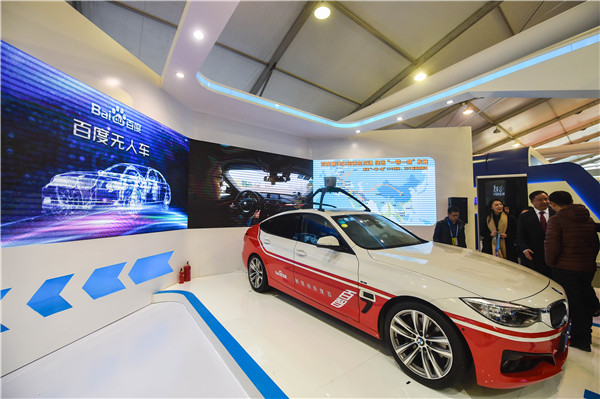 |
|
A driverless vehicle developed by the internet giant Baidu on display in December at an exposition in Wuzhen, Zhejiang province.XU YU/XINHUA |
However, there are still challenges, and right now the biggest obstacle to full commercialization is the high cost of the vehicles.
Based on advanced hardware-sonar devices, stereo cameras, lasers and radar, together with complex self-driving software-the cost of an autonomous car will be $7,000 to $10,000 higher than that of a traditional vehicle by 2025, according to a report by IHS, an auto industry consultancy, which said technological developments will see the price premium drop to around $5,000 in 2030 and $3,000 in 2035.
LiDAR, a laser radar system that Google installs on the roofs of vehicles to provide a 3-D picture of the surroundings, costs between $75,000 and $85,000, which means it is too expensive to be fitted in commercial vehicles.
Even after the supplier, Velodyne Acoustics, introduced a cut-price, minimal system at a cost of $30,000 to $40,000 in 2014, only automakers and suppliers could afford to buy the technology for testing purposes.
That offers an opportunity to Chinese entrepreneurs, whose forte is squeezing costs.
In December, Baidu tested two prototypes of autonomous cars-BMW 3 Series Gran Turismo models-priced at 400,000 yuan to 700,000 yuan ($61,520 to $107,660). Both cars were fitted with LiDAR systems that cost 700,000 yuan each.
"Such a high price will only be feasible at the testing stage, it will definitely need to be reduced substantially when being commercialized in the future," said Wang Jin, who runs Baidu's autonomous driving division, quoted in Shanghai's The Paper in December.
By using the word "substantially", Wang was making it clear that he expects the price of lower-resolution guidance models to fall by about 90 percent, not the 50 percent sugg-ested by suppliers such as Velodyne Acoustics.
In March, Wang told the media that the company is cooperating with suppliers and hopes to reduce the cost of the radar system to about 20,000 yuan-2.85 percent of the cost of the LiDAR system used in December-in three to five years, by which time Baidu will begin mass production of driverless cars.
So far, Baidu has managed to reduce the cost to less than 200,000 yuan (less than one-third of the original cost), he added.
